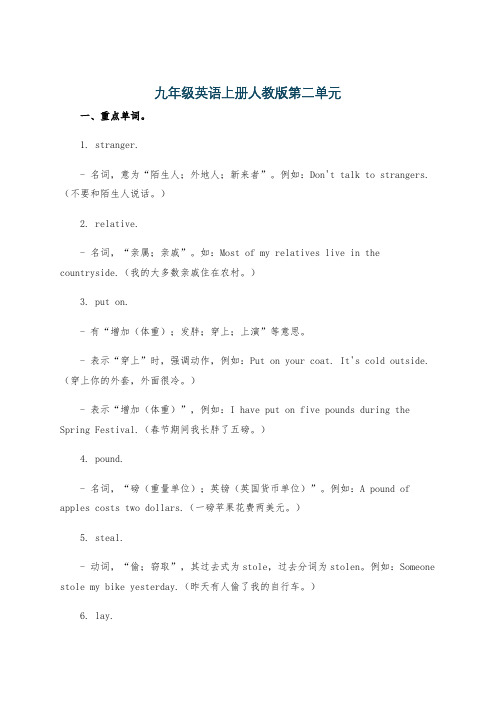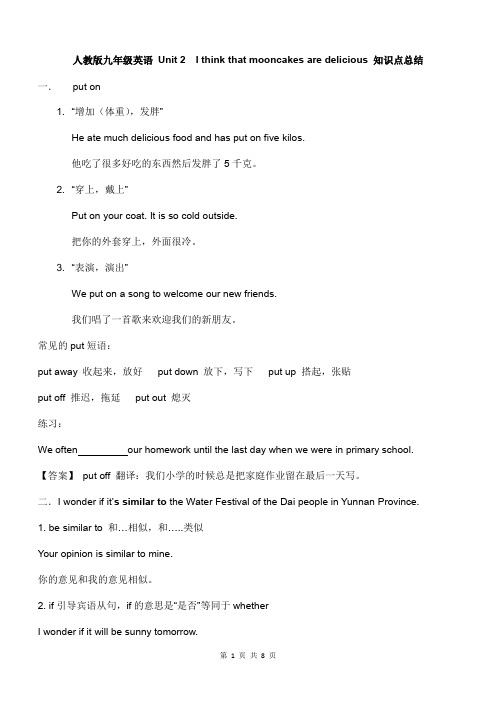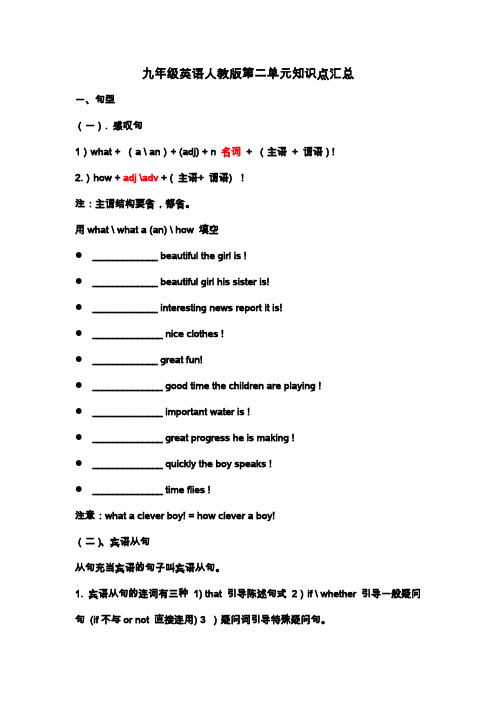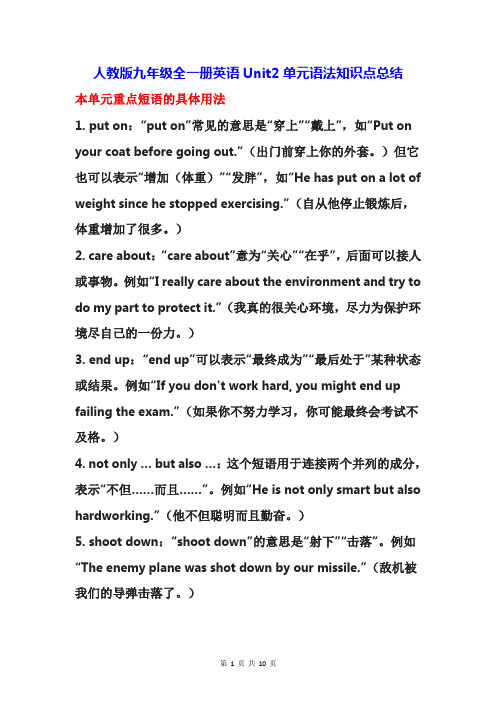人教版九年级英语第二单元知识点汇总
- 格式:docx
- 大小:25.91 KB
- 文档页数:7

九年级英语上册人教版第二单元一、重点单词。
1. stranger.- 名词,意为“陌生人;外地人;新来者”。
例如:Don't talk to strangers.(不要和陌生人说话。
)2. relative.- 名词,“亲属;亲戚”。
如:Most of my relatives live in the countryside.(我的大多数亲戚住在农村。
)3. put on.- 有“增加(体重);发胖;穿上;上演”等意思。
- 表示“穿上”时,强调动作,例如:Put on your coat. It's cold outside.(穿上你的外套,外面很冷。
)- 表示“增加(体重)”,例如:I have put on five pounds during the Spring Festival.(春节期间我长胖了五磅。
)4. pound.- 名词,“磅(重量单位);英镑(英国货币单位)”。
例如:A pound of apples costs two dollars.(一磅苹果花费两美元。
)5. steal.- 动词,“偷;窃取”,其过去式为stole,过去分词为stolen。
例如:Someone stole my bike yesterday.(昨天有人偷了我的自行车。
)6. lay.- 动词,“放置;安放;产(卵);下(蛋)”,其过去式为laid,过去分词为laid。
例如:The hen lays an egg every day.(这只母鸡每天下一个蛋。
)- 区别于lie(躺;位于),lie的过去式为lay,过去分词为lain。
7. dessert.- 名词,“(饭后)甜点;甜食”。
例如:Ice - cream is my favorite dessert.(冰淇淋是我最喜欢的甜点。
)8. garden.- 名词,“花园;园子”。
例如:There are many beautiful flowers in the garden.(花园里有许多美丽的花朵。

人教版九年级英语第二单元知识点梳理Unit 2 I think that moon cakes are delicious!一、短语:1.the Lantern Festival元宵节2.the Dragon Boat Festival端午节3.the Water Festival泼水节4.remind sb.of使某人想起5.eat five meals a day一天吃五餐6.put on five pounds体重增加了五磅7.treat sb.with.用/以……对待某人8.be similar to...与.......相似9.end up最终成为/处于10.share sth.with sb.与……分享……11.as a result结果12.one...the other...(两者中的)一个…另一个…13.take sb.out for dinner带某人出去吃饭14.dress up乔装打扮15.haunted house鬼屋16.the beginning of new life新生命的开始二、知识点:1.宾语从句:(三大考点:引导词、时态和语序。
)宾语从句在复合句中作主句的宾语,由连接词+主语+谓语构成,常由下面的这些词引导:①由that引导,表示陈述意义,that可省略:He says(that)he is at home.他说他在家里。
②由if或whether引导,表示一般疑问意义(带有是否、已否、对否等):I don’t know if/whether Wei Hua likes fish.我不知道韦华是否喜欢鱼。
③由连接代词、连接副词(疑问词)引导,表示特殊疑问意义:Do you know what he wants to buy?你知道他想要买什么吗?④从句时态要与主句一致:当主句是一般现在时,从句根据情况使用任何时态;当主句是一般过去时,从句应使用过去某时态(一般过去时,过去进行时,过去将来时,过去完成时)He said(that)he was at home.他说他在家里。

Unit 2 I think that mooncakes are delicious!一、词汇与短语◆重点单词A部分1.mooncake 月饼n.2.lantern 灯笼n.3.stranger 陌生人n.4.relative 亲属;亲戚n.5.pound 磅(重量单位);英镑(英国货币单位) n.6.folk 民间的;民俗的adj. 7.goddess 女神n.8.whoever 无论谁;不管什么人pron. 9.steal 偷;窃取v.10.lay 放置;安放;产(卵);下(蛋) v. 11.dessert (饭后)甜点;甜食n.12.garden 花园;园子n. 13.tradition 传统n.14.admire 欣赏;仰慕v.15.tie 领带n. 捆;束v.B部分1.haunted 有鬼魂出没的;闹鬼的adj.2.ghost 鬼;鬼魂n.3.trick 花招;把戏n.4.treat 款待;招待n. 招待;请(客)v. 5.spider 蜘蛛n.6.Christmas 圣诞节n.7.lie 存在;平躺;处于v.8.novel (长篇)小说n.9.eve 前夕;前夜n.10.dead 死的;失去生命的adj. 11.business 生意;商业n.12.punish 处罚;惩罚v.13.warn 警告;告诫v.14.present 现在;礼物n. 现在的adj. 15.warmth 温暖;暖和n.16.spread 传播;展开v. 蔓延;传播n.◆重点短语A部分1.put on增加(体重);发胖2.sound like……听起来像……3.the hottest month of the year 一年中最热的月份4.call out one's name to……对着……喊出某人的名字5.be similar to……和……相似6.throw……at……朝……扔……7.wash away 冲洗掉8.in the shape of……以……的形状9.carry sth. to sb. 把某物带给某人10.shoot down 射掉11.plan to do sth.计划做某事12.refuse to do sth. 拒绝做某事13.fly up to……飘向……14.from……to……从……到……15.lay out摆开;布置16.share……with……和……分享……17.come/be/get back 回来18.give sth. to sb. 给某人某物19.take sb. out for dinner 带某人出去吃晚饭20.help (to) do sth. /help with sth. 帮助做某事B部分1.dress up打扮;装扮2.trick or treat 不招待就使坏3.learn about 了解4.think of/think about 想到;考虑5.the true meaning of………的真正意义6.the importance of…………的重要性7.a novel written by…………写的小说8.care about 关心9.used to do sth. 过去常常做某事10.warn sb. to do sth. 告诫某人去做某事11.end up最终成为;最后处于12.expect sb. to do sth. 期待某人做某事13.take sb. back to sp. 把某人带回到某地14.wake up 醒来15.remind sb. of sth. /sb.使某人想起某物/16.decide to do sth. 决定做某事某人17.change one's life改变某人的生活18.promise to do sth. 承诺做某事19.in need需要20.treat sb. with……用……招待某人21.the beginning of…………的开端22.give birth to life 孕育新生命23.a symbol of…………的象征24.not only…but also…不但…而且…25.spread……around 到处传播……26.give out 分发◆重点句子A部分1.比尔想知道他们明年是否可以再吃到粽子。

人教版九年级英语第二单元知识点总结一、重点词汇解析1.mooncake /ˈmuːnkeɪk/ 月饼-解析:由moon(月亮)和cake(蛋糕)组成,是中秋节的传统食品。
-例句:We eat mooncakes on Mid-Autumn Festival.(我们在中秋节吃月饼。
)ntern /ˈlæntən/ 灯笼-解析:一种照明工具,通常在节日中使用。
-例句:There are many beautiful lanterns in the park.(公园里有很多漂亮的灯笼。
)3.stranger /ˈstreɪndʒə(r)/ 陌生人-解析:不认识的人。
-例句:Don't talk to strangers.(不要和陌生人说话。
)4.relative /ˈrelətɪv/ 亲属;亲戚-解析:和自己有血缘或婚姻关系的人。
-例句:We visited our relatives during the holiday.(我们在假期拜访了亲戚。
)5.put on 增加(体重);发胖-解析:指身体的重量增加。
-例句:She has put on some weight.(她长胖了一些。
)y /leɪ/ 放置;安放;产(卵);下(蛋)-解析:过去式和过去分词分别为laid /leɪd/。
-例句:She laid the book on the table.(她把书放在桌子上。
)二、重点短语1.the Water Festival 泼水节-解析:一些国家和地区的传统节日。
-例句:The Water Festival is very lively.(泼水节非常热闹。
)2.the Dragon Boat Festival 端午节-解析:中国的传统节日,有赛龙舟、吃粽子等习俗。
-例句:We eat zongzi on the Dragon Boat Festival.(我们在端午节吃粽子。
)3.the Spring Festival 春节-解析:中国最重要的传统节日。

人教版九年级英语unit2知识归纳人教版九年级英语unit2知识1单词Mooncake ['mu:nke?k] n. 月饼lantern [?l?nt? (r)n] n. 灯笼stranger [?streind?? (r)] n. 陌生人relative [?rel?tiv] n. 亲属;亲戚put on 增加(体重);发胖pound [paund] n. 磅(重量单位);英镑folk [f?uk] adj. 民间的;民俗的goddess [?g?des][?ɡɑd?s] n. 女神whoever [hu:?ev? pron.无论是谁;不管谁;任何人steal [sti:l] v. (stole [st?ul], stolen [st?ul?n]) 偷;窃取lay [lei] v. (laid [leid], laid) 放置;产(卵)lay out 摆开;布置dessert [di?z?:(r)t] n.( 饭后)甜点;甜食garden [ga:(r)dn] n. 花园;园子 tradition [tr??d??n] n.传统admire [?d?mai? (r)] v. 欣赏;仰慕tie [tai] n. 领带 v. 捆;束haunted [?h?:ntid] adj.有鬼魂出没的 ghost [g?ust] n. 鬼;鬼魂trick [trik] n. 花招;把戏treat [tri:t] n. 款待;招待;请客spider [?spaid?r)] n. 蜘蛛Christmas [?krism?s] n. 圣诞节lie [laI] v. (lay [leI],lain [leIn]) 存在;平躺;处于novel [?n?vl] [?na:vl] n.(长篇)小说eve [i:v] n.(尤指宗教节假日的)前夕;前夜dead [ded] adj.死的;失去生命的business [?bizn?s] n. 生意;商业punish [?p?nis] v. 处罚;惩罚 warn [w?:(r)n] v. 警告;告诫end up 最终成为;最后处于present [preznt] n. 现在;礼物 adj. 现在的nobody [n?ub?di] [n?uba:di] pron. 没有人 warmth [w?:(r)mθ] n. 温暖;暖和spread [spred] v. 传播;展开 n. 蔓延;传播Macao [m??kau] 澳门Chiang Mai [?t?i?n?maI], [d?a:nmaI] 清迈(泰城市)Water Festiwal 泼水节Mid-Autumn中秋节Mother's Day母亲节Father's Day 父亲节Halloween [?h?l?u?i:n] 万圣节前夕A Christmas Carol 《圣诞欢歌》(小说名)Easter 复活节Clara [?kla:r?] [?kler?] 克拉拉(女名)Santa [?s?nt?] Claus [kl?:z] 圣诞老人Charles [t?a:(r)lz] Dickens [?dik?nz] 查尔斯 ? 狄更斯(英)Scrooge [skru:d?] 斯克鲁奇 n.(非正式)吝啬鬼Jacob [?d?eik?b]Marley [?ma:(r)li] 雅各布 ? 马利人教版九年级英语unit2知识2知识梳理【重点短语】1.put on 增加(体重);发胖2.care about 关心; 在乎3.end up 最终成为,最后处于4.not only ……but also……不但……而且……5.shoot down 射下ed to do 过去常常做……7.remind sb. of 使某人想起8.give out 分发发放9.the water festival 泼水节10.the Chinese spring festival 中国春节11.next year 明年12.sound like 听起来像13.each other 互相彼此14.in the shape of 以……的形状15.on mid-autumn night 在中秋之夜16.fly up to 飞向y out 摆开布置18e back 回来19.as a result 结果因此20.Mother’s day 母亲节21.more and more popular 越来越受欢迎22.think of 想起 ;认为 ;思考23.dress up 装扮穿上盛装24.the importance of ……的重要性25.make money 挣钱26.in need 需要帮助处于困境中27.between …and…在……和……之间28.the dragon boat festival 龙舟节29.the lantern festival 元宵节30.like best 最喜欢31.go to …for a vacation 去……度假32.be similar to 与……相似33.wash away 冲走洗掉34.Mid-autumn festival 中秋节35.shoot down 射下36.call out 大声呼喊37.the tradition of ……的传统38.at night 在夜里; 在晚上39.one…,the other…一个……,另一个…...40.Father’s day 父亲节【重点句型】1. I think that they’ re fun to watch.我认为它们看着很有意思。

人教版九年级unit2知识点九年级英语知识点总结Unit 2在九年级英语课程的第二单元中,我们学习了许多重要的知识点。
本文将对这些知识点进行总结和回顾,以帮助大家更好地复习和巩固所学内容。
一、动词时态与语态1. 一般现在时:表示经常性或习惯性的动作或状态。
eg. She often goes to the park on weekends.2. 现在进行时:表示现阶段正在进行的动作。
eg. They are watching a movie in the cinema.3. 一般过去时:表示过去某个时间发生的动作或存在的状态。
eg. Yesterday, I visited my grandparents.4. 过去进行时:表示过去某个时间正在进行的动作。
eg. We were playing football in the park when it started to rain.5. 一般将来时:表示将来某个时间会发生的动作或存在的状态。
eg. They will have a picnic next Sunday.6. 被动语态:表示动作的接受者重要于动作的执行者。
eg. The book was written by Mark Twain.二、形容词与副词比较级与最高级1. 比较级:用来比较两个事物的程度,常在形容词前加-er或在副词前加more。
eg. This book is more interesting than that one.eg. She runs faster than me.2. 最高级:用于比较多于两个事物的程度,常在形容词前加-est或在副词前加most。
eg. It was the most beautiful sunset I have ever seen.三、名词所有格1. 名词所有格表示所属关系,一般在名词后加's。
eg. This is Mary's pencil.2. 若名词是复数形式且以-s结尾,则只需在末尾加'。

人教版九年级英语第二单元知识点汇总人教版九年级英语第二单元知识点总结Unit 2 I think that mooncakes are delicious一单词XXX二1.put短语put on增加,穿上put up张贴,搭建,举起put away收拾好put off(doing)推迟put down记下,放下put out扑灭put into放进2.XXXlie–lied–lied-lying,说谎lie—lay–lain-lying,躺/位于,存在于lay—laid–laid-laying,放置/下蛋,产卵3.admireadmire sb, admire sth, XXXXXX.XXX.4.tie v系n领带/present n=gift礼物在场的be present目前at presentmean adj吝啬的v意义是,意味着mean doing sth计划做某事mean to do sth5.play a trick on sb /play tricks on sb be a time for doing sth/to do sthXXX (万圣节用语)不给糖果就捣蛋16.XXX n7.warn sb (not) to do sthput…around…(put things XXX)放在…周围take/show sb around带或人到处转8.end upend up with背面的宾语是其主语的一局部,而end up in 背面的宾语是其主语(一件工作、一个举动等)的结果。
:XXX XXX.(a song是主语XXX的一局部,即歌曲以后全部集会竣事).XXX(failure是主语Their effort 的成效).end up XXX以做…竣事9. in two weeks,两周后,用普通未来时XXXplan to do sth = plan on doing sth =make plans to do sth.计划做某事句型:such+a/an+形容词+单数名词+ that从句句型:such+形容词+复数可数名词+ that从句句型:such+描述词+不成数名词+ that从句句型;so+描述词/副词+that从句句型:so +描述词+ a/an +单数名词+ that从句句型;so + many/ few +复数名词+ that从句句型:so +much/ little +不可数名词+ that从句211. refuse to do XXX回绝去做某事接不定式作宾语的动词:三个但愿两应允(hope, wish, want, agree, promise)两个请求莫回绝(demand, ask, refuse)设法学会做决定(manage, learn, decide)不要假装在选择(pretend, choose)12.dress sb. up给某人打扮dress up in +衣服/颜色dress up as +人XXX给或人本人穿衣服13.the Water Festival, the Dragon Boat Festival, the Spring Festival, the Lantern Festival, watch theraces, a little crowded, like sth best, go to sp for one’s vacation, enjoy doing sth., eat out, five meals a day,sound like, throw water at each other, wash away, have good luck, in the shape of, carry …to…, shootdown, try to do sth., fly up to, lay out, start the tradition of, one…, the other…, give…to…,ta ke sb outfor sth, more and more popular, care about, make money,expect sb. to do sth., wake up, find out, inneed, make sb. do sth., give birth to life 141)Bill XXX.2)Bill wonders whether they’ll have the sweet XXX.next year将来时the next year过去时3)I wonder if it’s similar to the water festival of Dai people in XXX Province.be similar to, be the same as, be different from4)Chinese people have been celebrating Middle-XXX XXX)They carry people’s wishes to the families they love and miss.6)However, most people think that the story of Chang’e is the most touching.7)XXX.8)Hou Yi was so sad that he called out her name to the moon every night.3call out … to…对着……大呼……9)XXX, XXX.Not only do people spread them around in different XXXhunt, but they also give out these treats as gifts.句中的not only ... but (also) ...意为“不但……而且……”。

人教版九年级英语unit2知识点归纳Unit 2: English Around the WorldEnglish is one of the most widely spoken languages in the world. It is not only the native language of several countries, including the United States, the United Kingdom, and Australia, but also serves as a lingua franca in many regions. In this unit, we will explore various aspects of the English language and its global influence.1. English Varieties:English is a diverse language with various regional accents and dialects. The most commonly recognized varieties are British English and American English. British English is spoken in the United Kingdom and countries that were formerly part of the British Empire. American English, on the other hand, is spoken in the United States and is heavily influenced by immigrant populations. Other English varieties include Australian English, Canadian English, and Indian English.2. English Spelling and Pronunciation:English spelling can be quite challenging due to its historical development and the influences of other languages. It is known for its irregularities and discrepancies between spelling and pronunciation. For example, the word "ough" can be pronounced differently in words like "rough," "bough," "through," and "cough." Additionally, the silent letters in words such as "knight" and "honest" add to the complexity of English spelling.3. English Grammar:English grammar consists of various aspects, including tenses, verb patterns, and sentence structure. Tenses play a crucial role in expressing time and actions. The basic tenses include present, past, and future, which can be further modified with perfect or continuous aspects. Verbs can also have different patterns, such as transitive, intransitive, or phrasal verbs. Furthermore, English sentence structure follows a subject-verb-object order in declarative sentences.4. English Words and Vocabulary:English vocabulary is diverse and constantly evolving. It borrows words from other languages and incorporates them into its lexicon. This can be seen in words of French origin like "entrepreneur" and Latinorigin like "circumference." Furthermore, English has a large number of synonyms and antonyms, which provide speakers with a wide range of expression.5. English as a Global Language:English has become the lingua franca of the world due to historical, cultural, and economic reasons. It is used as a common language for international communication in various fields such as business, technology, and academia. Proficiency in English opens up opportunities for individuals in terms of education, employment, and cross-cultural understanding.In conclusion, Unit 2 of the 9th-grade English textbook provides a comprehensive overview of the different aspects of the English language. Understanding the regional varieties, spelling, grammar, vocabulary, and global influence of English allows students to develop their language skills and navigate the interconnected world we live in. Mastery of the English language not only enhances communication but also broadens horizons and fosters a deeper appreciation for cultural diversity.。

人教版九年级英语第二单元知识点总结Unit 2: XXX usVocabulary:1.Mooncake。
lantern。
stranger。
relative。
put on。
pound。
folk。
goddess。
whoever。
steal。
lay out。
dessert。
garden。
n。
admire。
tie。
haunted。
ghost。
trick。
treat。
spider。
Christmas。
lie。
novel。
eve。
dead。
business。
punish。
warn。
end up。
present。
warmth。
spread。
lay.Grammar:1.Phrasal verb "put"Put on: to wearPut up: to hang。
build。
or raisePut away: to tidy upPut off: to postponePut down: to write down or place downPut out: to extinguishPut into: to place into2."Lay" verb formsXXX–lied–lied-lying: to tell a XXXXXX–lain-lying: XXXLay—laid–laid-laying: to place or lay eggs3."Admire" usageAdmire sb/sthXXXXXX.XXX.4."XXX" verb usageTie + n (e.g。
tie a tie)Present n = giftBe present: currently existingXXX adj: stingyXXX: XXXMean to do sth: plan to do sth5."Trick or XXX" usagePlay a trick on sb / play tricks on sbBe a time for doing sth / to do sthXXX a trick6."XXX" usage7."Warn sb (not) to do sth" usagePut…around… (e.g。

人教版九年级英语Unit 2 I think that mooncakes are delicious 知识点总结一.put on1. “增加(体重),发胖”He ate much delicious food and has put on five kilos.他吃了很多好吃的东西然后发胖了5千克。
2. “穿上,戴上”Put on your coat. It is so cold outside.把你的外套穿上,外面很冷。
3. “表演,演出”We put on a song to welcome our new friends.我们唱了一首歌来欢迎我们的新朋友。
常见的put短语:put away 收起来,放好put down 放下,写下put up 搭起,张贴put off 推迟,拖延put out 熄灭练习:We often our homework until the last day when we were in primary school.【答案】put off 翻译:我们小学的时候总是把家庭作业留在最后一天写。
二.I wonder if it’s similar to the Water Festival of the Dai people in Yunnan Province.1. be similar to 和…相似,和…..类似Your opinion is similar to mine.你的意见和我的意见相似。
2. if引导宾语从句,if的意思是“是否”等同于whetherI wonder if it will be sunny tomorrow.我想知道星期天是不是晴天。
三.After Hou Yi shot down the nine suns, a goddess gave him magic medicine to thank him.After意思是“在…之后”,引导时间状语从句After a breakfast, there was little left in my wallet.吃完早餐之后,我的钱包空空如也了。

Unit2 I think that mooncakes are delicious一、语法要点:(一)宾语从句:宾语从句就是由一个句子来构成主句的宾语We know (that)he likes English.主语谓语宾语1、宾语从句三要素:连接词、语序、时态①连接词:1)that(即陈述句作宾语从句。
that在从句中不充当任何句子成分,只起连接主句和从句的作用。
that不用翻译出来,在口语中常省略。
)The girl said, “I can help him.”→The girl said (that) she could help him.2)if/whether(whether或if在句中不充当任何句子成分,只起连接作用,但不能省略。
翻译成“是否”。
主句 + if / whether + 由一般疑问句变成的陈述句形式。
)Li Lei wonders . Is Jim in ? → Li Lei wonders if Jim is in.3)who,whose,what,how,which,how many,how much等。
(原有的特殊疑问词+句子剩余部分的陈述句形式)He asks me, “What does your father do?”→He asks me what my father does.②时态:①当主句是一般现在时,从句用该用的时态(即从句的时态不受影响)②当主句是一般过去时态,从句必须用过去的某一时态。
I don't know when he will come back.我不知道他将何时回来。
He tells me that his sister came back yesterday.他告诉我他姐姐昨天回来了。
The children didn't know who he was.孩子们不知道他是谁。
He asked his father how it happened.他问他父亲这件事是如何发生的。

人教版九年级全一册第二单元知识点Unit2. I think that mooncakes are delicious!一、重点单词名词(n.)stranger 陌生人-strange 陌生的relative 亲戚dessert 饭后甜点garden 花园tradition 传统-traditional 传统的tie 领带novel 小说eve 前夕前夜business 生意商业present 礼物warmth 温暖动词(v.)steal 偷,窃-stole-stolen lay 放置/下蛋,产卵-laid-laid admire 欣赏仰慕treat 招待请客lie 处于/躺-lay-lain punish 处罚warn 警告spread 传播-spread-spread形容词(adj.)folk 民间的民俗的dead 死的失去生命的present 现在的动词短语put on 增加体重lay out 摆开,布置end up 最终成为二、重点知识点1. go on vacation 去度假on one’s vacation 在度假eg : What did you do on your vacation?2. put on 用法(1)增加体重后接“增长的具体重量或者weight”eg : He has put on 20 pounds since he was an adult./I’ve put on five pounds.(2)穿上,戴上eg : Please do put on your coat before you get out of the car.(3)上演(节目),举行(活动)eg : We plan to put on a play at the end of the term.3. be similar to 与---相似eg : My pen is similar to yours.(1)be the same as 与---相同(2)be different from 与---不同(3)have sth in common 在某方面有共同之处4. throw (sth) at(sb) 向某人扔某物eg : People go on streets to throw water at each other.(课本P10 2d)人们走上街头互相泼水5. wash away 冲走,冲刷eg : The new year is a time for cleaning and washing away bad things新年是清扫和洗去晦气的时候6. shoot down 射下击落(shoot -shot -shot)eg : The man shot down a bottle.常见的关于down 的短语:turn down 调低;拒绝break down 出故障cut down 砍倒calm down 冷静put down 放下write down7. steal - stole - stolen 偷窃取steal sth from ---eg : The thief has stolen more than 200 yuan .8. lay out 摆开,布置(lay -laid -laid laying)还有“产卵下蛋”之意eg : He quickly laid out her favorite fruits and desserts(饭后甜点)in the9. trick or treat(1)treat 名词款待eg : Let’s go out for dinner.My treat.(我请客)(2)v.动词treat sb to ---请某人吃---eg : I wonder if you want to treat me to dinner.(3)treat sb as/like ---把---当作---看待eg : They treat the cat as a member of their family.他们把这只猫当作他们家庭的一份子看待。

精品基础教育教学资料,仅供参考,需要可下载使用!人教新目标版九年级全一册Unit 2 I think that mooncakes are delicious!Section A1.put on增加(体重);发胖eg:I can eat whatever I want because I never put on weight.穿上;上演eg:She put on her coat and went out.put短语put down 放下put off 推迟,延迟put up 张贴,搭建,举起put out扑灭put away放好,把……收起来2.pound(£)磅、英磅eg: The apples cost one dollar a pound.dollar($)yuan(¥)没有复数形式3.in two weeks两周后in +一段时间在……之后eg:She has gone to Beijing,and she will be back in two days.提问时用How soon4.similar相似的,类似的similar短语be similar to和……相似be similar in在……方面相似the same as与……相同5.whoever无论谁;不管什么人=anybody that引导名词性从句eg:Whoever visits the town will be welcome.eg:Give it to whoever you like.6.steal偷;窃取steal sth. from从……偷某物eg:He stole some money from his mother.have sth. stolen(让)某物被偷eg:She had her purse stolen. =Her purse was stolen.7.refuse拒绝refuse to do sth.拒绝做某事refuse sth.拒绝某事y放置;安放;产(卵);下(蛋)过去式过去分词均为laideg:Lay out the map on the table and let's have a look.eg:My hen laid an egg last night.lie躺下过去式:lay过去分词:lain说谎过去式:lied过去分词:lied9.admire观赏,欣赏eg:Do you admire this picture?admire...for...因……而钦佩/赞赏……eg:We admire Ann for her courage.10.share分享;共享;分摊eg:There is only one bedroom, so we’ll have to share.share sth. with sb和某人分享或合用某物eg:I really want to share my happiness with you.11.宾语从句(一)定义:由一个句子充当宾语,这个句子就叫宾语从句常见关系词有:that,if,whether,what,who,where,why和how that无词义在口语或非正式文体中常省略eg:He said (that) he could finish his work beforewhether,if意思是“是否”只能用whether,不能用if介词后面eg:I'm thinking of whether we should go to see the film.与or not连用eg:I can't say whether or not they can come on time.否定否定前置主句中的主语是第一人称代词I或we谓语动词是think,believe,expect,guess,suppose等eg:I don't think that Jack can finish his homework by himself.12.感叹句what引导What+a/an+形容词+单数名词(+主语+谓语)eg:What an interesting story (it is)!What+形容词+复数名词(+主语+谓语)eg:What beautiful flowers (they are)!What+形容词+不可数名词(+主语+谓语)eg:What delicious food (it is)!how引导How+形容词(+主语+谓语)eg:How kind (the girl is)!How+副词(+主语+谓语)eg:How well (she dances)!How+主语+谓语eg:How time flies!Section B1.dress up乔装打扮;装扮dress up like/as...打扮成……eg: Alina dressed up as/like a boy.2.treatn.款待;招待v.招待;请(客)治疗eg:Which doctors are treating her for her illness?treat...as...把……看作……treat sb.to sth请某人吃某物3.care about关心,在意eg:She doesn't care about her husband at all.辨析care about强调因责任感而关心;在乎eg:Your mother truly cares about you.care for照料;照顾=take care ofeg:He has to care for his sister at home.喜欢= be fond of多用于疑问句和否定句4.dead死的;失去生命的eg:That is a dead dog.辨析deadadj.强调“死”的状态作表语或定语可以和时间段边用diev.强调“死”的瞬间动作不能和时间段连用deathn.死;死亡dyingdie的现在分词adj.垂死、要死用作定语或表语5.business公事;商业;生意不可数名词短语on business出差do business做生意business hours办公时间;营业时间6.punish处罚;惩罚句型punish sb. for...因……而处罚某人punish sb. with/by...处某人以……7.warnn.警告;告诫eg:He warned her to keep silent.他告诫她保持沉默8.end up最终成为;最后处于eg: The party ends up with a poem.句型end up in...以某种结局结束eg: If you don't listen to me, you will end up in failure.end up doing sth.以做某事结束eg: At first they hated each other, but they ended up getting married.end up +adj.以……结束eg: If he goes on driving like this, he will end up dead.9.expect期待;预料句型expect to do sth.期待做某事expect sb. to do sth.期待某人做某事expect + that 从句eg: I expect that I'll be back next Monday.10.presentn.现在;礼物at presenteg:I don't have any dictionary at present.adj.现在的eg:He doesn't feel satisfied with his present job.11.spreadv.传播;展开eg:CCTV 1 spread the news as soon as the accident happened.n.蔓延;传播eg: The spread of the disease frightened the villagers.12.give out用尽;分发用完,耗尽发出( 光、热、烟、雾)=give off宾语是代词时,要置于give 与out之间eg:Give them out, please.宾语是名词时,可置于副词之前或之后eg: He is giving out the papers to his classmates.Section A1.put on增加(体重);发胖eg:I can eat whatever I want because I never put on weight.穿上;上演eg:She put on her coat and went out.put短语put down 放下put off 推迟,延迟put up 张贴,搭建,举起put out扑灭put away放好,把……收起来2.pound(£)磅、英磅eg: The apples cost one dollar a pound.dollar($)yuan(¥)没有复数形式3.in two weeks两周后in +一段时间在……之后eg:She has gone to Beijing,and she will be back in two days.提问时用How soon4.similar相似的,类似的similar短语be similar to和……相似be similar in在……方面相似the same as与……相同5.whoever无论谁;不管什么人=anybody that引导名词性从句eg:Whoever visits the town will be welcome.eg:Give it to whoever you like.6.steal偷;窃取steal sth. from从……偷某物eg:He stole some money from his mother.have sth. stolen(让)某物被偷eg:She had her purse stolen. =Her purse was stolen.7.refuse拒绝refuse to do sth.拒绝做某事refuse sth.拒绝某事y放置;安放;产(卵);下(蛋)过去式过去分词均为laideg:Lay out the map on the table and let's have a look.eg:My hen laid an egg last night.lie躺下过去式lay过去分词lain说谎过去式lied过去分词lied9.admire观赏,欣赏eg:Do you admire this picture?admire...for...因……而钦佩/赞赏……eg:We admire Ann for her courage.10.share分享;共享;分摊eg:There is only one bedroom, so we’ll have to share.share sth. with sb和某人分享或合用某物eg:I really want to share my happiness with you.11.宾语从句(一)定义:由一个句子充当宾语,这个句子就叫宾语从句常见关系词有:that,if,whether,what,who,where,why和how that无词义在口语或非正式文体中常省略eg:He said (that) he could finish his work beforewhether,if意思是“是否”只能用whether,不能用if介词后面eg:I'm thinking of whether we should go to see the film.与or not连用eg:I can't say whether or not they can come on time.否定否定前置主句中的主语是第一人称代词I或we谓语动词是think,believe,expect,guess,suppose等eg:I don't think that Jack can finish his homework by himself.12.感叹句what引导What+a/an+形容词+单数名词(+主语+谓语)eg:What an interesting story (it is)!What+形容词+复数名词(+主语+谓语)eg:What beautiful flowers (they are)!What+形容词+不可数名词(+主语+谓语)eg:What delicious food (it is)!how引导How+形容词(+主语+谓语)eg:How kind (the girl is)!How+副词(+主语+谓语)eg:How well (she dances)!How+主语+谓语eg:How time flies!Section B1.dress up乔装打扮;装扮dress up like/as...打扮成……eg: Alina dressed up as/like a boy.XX学校用心用情服务教育!2.treatn.款待;招待v.招待;请(客)治疗eg:Which doctors are treating her for her illness?treat...as...把……看作……treat sb.to sth请某人吃某物3.care about关心,在意eg:She doesn't care about her husband at all.辨析care about强调因责任感而关心;在乎eg:Your mother truly cares about you.care for照料;照顾=take care ofeg:He has to care for his sister at home.喜欢= be fond of多用于疑问句和否定句4.dead死的;失去生命的eg:That is a dead dog.辨析deadadj.强调“死”的状态作表语或定语可以和时间段边用diev.XX学校用心用情服务教育!强调“死”的瞬间动作不能和时间段连用deathn.死;死亡dyingdie的现在分词adj.垂死、要死用作定语或表语5.business公事;商业;生意不可数名词短语on business出差do business做生意business hours办公时间;营业时间6.punish处罚;惩罚句型punish sb. for...因……而处罚某人punish sb. with/by...处某人以……7.warnn.警告;告诫eg:He warned her to keep silent.他告诫她保持沉默8.end up最终成为;最后处于eg: The party ends up with a poem.句型end up in...以某种结局结束eg: If you don't listen to me, you will end up in failure.end up doing sth.以做某事结束eg: At first they hated each other, but they ended up getting married.end up +adj.以……结束eg: If he goes on driving like this, he will end up dead.9.expect期待;预料句型expect to do sth.期待做某事expect sb. to do sth.期待某人做某事expect + that 从句eg: I expect that I'll be back next Monday.10.presentn.现在;礼物at presenteg:I don't have any dictionary at present.adj.现在的eg:He doesn't feel satisfied with his present job.11.spreadv.传播;展开eg:CCTV 1 spread the news as soon as the accident happened.n.蔓延;传播eg: The spread of the disease frightened the villagers.12.give out用尽;分发用完,耗尽发出( 光、热、烟、雾)=give off宾语是代词时,要置于give 与out之间eg:Give them out, please.宾语是名词时,可置于副词之前或之后eg: He is giving out the papers to his classmates.。

人教新目标英语九年级Unit2单元知识点归纳总结.doc人教新目标英语九年级Unit2Ithinkthatmooncakesaredelicious!一.短语归纳1.puton增加(体重)发胖2.careabout关心在乎3.endup最终成为,最后处于4.notonly……butalso…不但…而且5.shootdown射下edtodo过去常常做……7.remindsb.of使某人想起8.giveout分发发放9.thewaterfestival泼水节10.theChinesespringfestival中国春节11.nextyear明年12.soundlike听起来像13.eachother互相彼此14.intheshapeof以……的形状15.onmid-autumnnight在中秋之夜16.flyupto飞向yout摆开布置eback回来19.asaresult结果因此20.mother’sday母亲节21.moreandmorepopular越来越受欢迎22.thinkof想起认为思考23.dressup装扮穿上盛装24.themportanceof……的重要性25.makemoney挣钱26.inneed需要帮助处于困境中27.between…and……在……和…之间28.thedragonboatfestival 龙舟节29.thelanternfestival元宵节30.likebest最喜欢31.goto……foravacation去……度假32.besimilarto与……相似33.washaway冲走洗掉34.mid-autumnfestival中秋节35.shootdown射下36.callout大声呼喊37.thetraditionof……的传统38.atnight在夜里在晚上39.one……,theother……一个……,另一个…40.Father’sd ay父亲节41.haveto必须不得不42.playatrickonsb捉弄某人43.thespiritof……的精神44.careabout关心45.wakeup醒来46.thebeginningof……的开始二.用法集萃感叹句式一:What+(a/an)+adj+名词(+主语+谓语+其他)!多么……的……感叹句式二:How+adj/adv+主语+谓语+其他!……多么……!2.in+时间段在……后3.givesb.sth.给某人某物4.plantodosth计划做某事5.refusetodosth拒绝做某事6.oneof+名词复数形式……之一7.it+is+名词+odosth做某事是…8.what…thinkof…?认为…怎么样?9.makesbdosth让某人做某事edtobe过去是……11.warnsb(nottodosth告诫某人做12.tellsb(not)todosth 告诉某人做某事13.decidetodosth决定做某事14.promisetodosth承诺、答应做某事giveapersonalreaction泼水节theWaterFestival龙舟节theDragonBoatFestival春节theSpringFestival灯笼节theLanternFestival在泰国/香港/北京inThailand/HongKong/Beijing多么美好的一天!Whatagreatday!一点alittle/abit/alittlebit看望亲戚/朋友/同学visitrelatives/friends/classmates 出去吃饭eatout/gooutfordinner在六月inJune在(某人的)假期onthe/one’svacation一天吃五餐eatfivemealsaday看着很有意思befuntowatch增加(体重)/发胖/穿上puton在两周以后intwoweeks(将来时)aftertwoweeks(过去时)after+点(将来时或过去式)听起来像…soundlike+n或句子一年最热的月thehottestmonthoftheyear从…到…from…to…和…相似besimilarto/bethesameas …的时间thetimeof在街道上in/onthestreet把某物扔给某人/某地throwsth?tosb/sp 把某物向某人扔去?throw?sthat(带情感)彼此互相eachother…..的时候atimefordoing洗掉…washaway(有)好运(have)goodluck满月afullmoon品尝月饼enjoy?mooncakes.好几世纪forcenturies呈/以……的形状intheshapeof把…带给…carrysthtosb传统的民间故事traditionalfolkstories…的故事thestoryof…最令人感动的themosttouching射掉shootdown给某人某物givesb.sth./givesth.tosb.(为做某事)感谢某人thanksb.(fordoingsth.)(通过做)感谢某人thanksb.bydoingsth.计划做…plantodosth设法偷trytosteal不在家benothome拒绝做…refusetodosth飘向…flyupto对…喊出calloutone’snameto…摆开/布置layoutsthin/on/at回来comeback/beback/getback……的传统thetraditionof…赏月admirethemoon结果asaresult一个……另一个……one…theother…五月第二个星期thesecondSundayofMay 六月第三个星期天thethirdSundayofJune 母亲节/父亲节Mother’sDay/Father’sDay 给…礼物givegiftstosb带…出去吃饭takesboutfordinner/lunch越来越受欢迎moreandmorepopular展示/表达我们的爱showourlove花很多的钱spendalotofmoney帮助…做…help(to)dosth/helpwithsth打扮/装扮dressup装扮成卡通人物dressupasasb不招待就使坏trickandtreat看上去吓人/可怕lookscary关上/打开/调高/调低turnoff/on/up/down 把……放在…..周围putsth.around…寻求……askfor…开某人玩笑playatrick/ajokeonab.了解learnabout在北美inNorthAmerica给某人款待givesb.atreat考虑thinkof…的真正意义thetruemeaningof………(….的)最好的例子thebestexample(of)只想着自己onlythinkaboutoneself对别人友好treatothersnicely关心/关注careabout挣(更多)钱make(more)money 过去常常…usedtodosth.受到惩罚bepunished处某人以…punishsb.with/by…因…而处罚某人punishsb.for…告诫…去做…warnsb.todo提醒…要注意…warnsb.aboutsth.警告…不要做…warnsb.nottodo 最终成为endup期待…做…expectsb.todosth.带回到…takeback…把…带回到…takesbbacktosp 使…想起…remindsbofsth/sb提醒某人做…remindsbtodosth醒来wakeup查明/弄清情况findout决定做…decidetodosth改变…的生活changeone’slife承诺做…promisetodosth真需要inneed…对待…treatsbwith+adj…的开端thebeginningof的重要性theimportanceofdoingsth. 产生新生命givebirthtolife…的象征asymbolof不但…而且notonly…but(also)结果asaresult圣诞节前夕ChristmasEve13。

九年级英语人教版第二单元知识点汇总一、句型(一). 感叹句1)what + (a \ an)+ (adj) + n 名词+ (主语+ 谓语)!2.)how + adj \adv + ( 主语+ 谓语) !注:主谓结构要省,都省。
用what \ what a (an) \ how 填空●_____________ beautiful the girl is !●_____________ beautiful girl his sister is!●_____________ interesting news report it is!●______________ nice clothes !●_____________ great fun!●______________ good time the children are playing !●______________ important water is !●______________ great progress he is making !●______________ quickly the boy speaks !●______________ time flies !注意:what a clever boy! = how clever a boy!(二)、宾语从句从句充当宾语的句子叫宾语从句。
1. 宾语从句的连词有三种1) that 引导陈述句式2)if \ whether 引导一般疑问句(if不与or not 直接连用) 3 )疑问词引导特殊疑问句。
2. 宾语从句的语序必须是陈述语序,即:连接词+主语+谓语+其他。
(疑问词作主语或主语的定语,疑问句式与陈述句式相同)3. 宾语从句与主句的时态要相互呼应(主现从任意,主过从过去)。
即:如果主句的时态是一般现在时,宾语从句的时态根据具体情况来确定,可以是任何时态。
(若从句是客观事实、真理、名言等,则不受限制)I don’t think (that) you are right.Please tell us where we’ll go fishing tomorrow.Do you know when Mr. Smith moved here?如果主句的时态是一般过去时,宾语从句只能用相应的过去的时态(一般过去时,过去进行时,过去将来时,过去完成时)。

人教版九年级全一册英语Unit2单元语法知识点总结本单元重点短语的具体用法1. put on:“put on”常见的意思是“穿上”“戴上”,如“Put on your coat before going out.”(出门前穿上你的外套。
)但它也可以表示“增加(体重)”“发胖”,如“He has put on a lot of weight since he stopped exercising.”(自从他停止锻炼后,体重增加了很多。
)2. care about:“care about”意为“关心”“在乎”,后面可以接人或事物。
例如“I really care about the environment and try to do my part to protect it.”(我真的很关心环境,尽力为保护环境尽自己的一份力。
)3. end up:“end up”可以表示“最终成为”“最后处于”某种状态或结果。
例如“If you don't work hard, you might end up failing the exam.”(如果你不努力学习,你可能最终会考试不及格。
)4. not only … but also …:这个短语用于连接两个并列的成分,表示“不但……而且……”。
例如“He is not only smart but also hardworking.”(他不但聪明而且勤奋。
)5. shoot down:“shoot down”的意思是“射下”“击落”。
例如“The enemy plane was shot down by our missile.”(敌机被我们的导弹击落了。
)6. used to do:“used to do”表示过去常常做某事,但现在不再这样做了。
例如“I used to play basketball every day, but now I don't have time for it.”(我过去常常每天打篮球,但现在没有时间了。

黄金笔记 2初三上学期英语第二单元全解:宾语从句(一)考情分析:海南省近几年中考、模拟考都几乎有一道考察宾语从句的单项选择题,考生要十分注意此知识点。
宾语从句还可以在阅读中以长难句的形式出现。
一、概念什么叫宾语?宾语也叫受词,它是动作的承受者。
比如I love you的you就是承受love这个动作的承受着。
宾语在句中的哪个位置?1.一般放在及物动词后面。
如:Our team beat all the others.我们的球队打败了所有其他球队。
2.有时为了强调,宾语也可以放在句首,如:Two weeks you shall have .你可以有两周的时间。
3.名词作宾语。
Face the facts!面对现实!4.代词作宾语。
They won’t hurt us.他们不会伤害我们5. 数词作宾语。
If you add 5 to 5, you get 10如果你把5和5相加就会得到10二、宾语从句的用法:宾语是句子的一个重要成分,它可以由名词、代词、名词短语或句子充当。
当一个句子充当宾语时,这个句子就叫做宾语从句。
三、宾语从句结构:1、主句+ that(无词义,可省略)+从句(陈述句语序)2、主句+ whether / if (是否)+从句(陈述句语序)3、主句+疑问词+从句(陈述句语序)【将在第三单元讲解】四、宾语从句的引导词:引导宾语从句的引导词按所引导的句子结构特点可以分为三类。
1、that 引导的宾语从句:原句如果是陈述句,变宾语从句时要用 that 引导,that 无实义,只起到引导的作用。
在口语和非正式文体中常可省略。
如:(1)I think (that) I can sell newspapers.我想我可以卖报纸。
(2) I know (that) he is a Canadian athlete.我知道他是一名加拿大运动员。
(3) Do you think (that) the children need to write.你认为孩子们需要写一首歌吗?(4)Maria says (that) she doesn’t like the uniforms.玛丽亚说她不喜欢校服。
人教版九年级英语第二单元知识点总结Unit 2 I think that mooncakes are delicious一单词mooncake lantern stranger relative put on pound folk goddess whoever steal lay out dessert garden tradition admire tie haunted ghost trick treat spider Christmas lie novel eve dead business punish warn end up present warmth spread lay二1.put短语put on 增加,穿上 put up张贴,搭建,举起 put away收拾好put off(doing)推迟 put down记下,放下 put out扑灭 put into放进ylie – lied – lied-lying,说谎lie—lay – lain-lying,躺/位于,存在于lay—laid – laid-laying, 放置/下蛋,产卵3.admireadmire sb, admire sth, admire sb for sthsounds/looks/tastes/feels/smells + adj.sounds/looks/tastes/feels/smells +like +n.4.tie v 系 n 领带 /present n=gift礼物在场的 be present 目前 at presentmean adj 小气的 v 意思是,意味着mean doing sth打算做某事 mean to do sth5.play a trick on sb /play tricks on sb be a time for doing sth/to do sthtrick or treat (万圣节用语)不给糖果就捣蛋6.treat/regard/see sb as+ n7.warn sb (not) to do sthput…around…(put things like spiders and ghosts around the door) 放在…周围take/show sb around带某人四处转8.end upend up with后面的宾语是其主语的一部分,而end up in后面的宾语是其主语(一件事情、一个活动等)的结果。
:The meeting ended up with a song.(a song是主语The meeting 的一部分,即歌曲之后整个会议结束). Their effort ended up in failure(failure是主语Their effort 的结果).end up doing sth 以做…结束9. in two weeks,两周后,用一般将来时remind sb. of sthplan to do sth = plan on doing sth =make plans to do sth.计划做某事10.so.......that/such......that引导结果状语从句句型:such+a/an+形容词+ 单数名词 + that从句句型:such+形容词+ 复数可数名词 + that从句句型:such+形容词+ 不可数名词 + that从句句型;so+形容词/副词+that从句句型: so +形容词 + a/an + 单数名词 + that从句句型;so + many/ few + 复数名词 + that从句句型: so +much/ little + 不可数名词 + that 从句11. refuse to do sth拒绝去做某事接不定式作宾语的动词: 三个希望两答应(hope, wish, want, agree, promise)两个要求莫拒绝(demand, ask, refuse)设法学会做决定(manage, learn, decide)不要假装在选择(pretend, choose)12.dress sb. up 给某人打扮 dress up in +衣服/颜色dress up as +人 dress oneself 给某人自己穿衣服13.the Water Festival, the Dragon Boat Festival, the Spring Festival, the Lantern Festival, watch the races, a little crowded, like sth best, go to sp for one’s vacation, enjoy doing sth., eat out, five meals a day, sound like, throw water at each other, wash away, have good luck, in t he shape of, carry …to…, shoot down, try to do sth., fly up to, lay out, start the tradition of, one…, the other…, give…to…,take sb outfor sth, more and more popular, care about, make money, expect sb. to do sth., wake up, find out, in need, make sb. do sth., give birth to life141)Bill thinks that the races were not that interesting to watch.2)Bill wonders whether they’ll have the sweet rice dumplings again next year.next year 将来时 the next year 过去时3)I wonder if it’s similar to the water festival of Dai people in Yunnan Province.be similar to, be the same as, be different from4)Chinese people have been celebrating Middle-Autumn Festival and enjoying mooncakes for centuries. 5)They carry people’s wishes to the families they love and miss.6)However, most people think that the story of Chang’e is the most touching.7)Whoever drank this could live forever.8)Hou Yi was so sad that he called out her name to the moon every night.call out … to… 对着……大喊……9)He now treats everyone with kindness and warmth, spreading love and joy everywhere he goes. 15.Not only do people spread them around in different hiding places for an egghunt, but they also give out these treats as gifts.句中的not only ... but (also) ... 意为“不但……而且……”。
当not only位于句首时,其后的主谓要部分倒装。
此外,当not only ... but (also) ... 连接两个代词或名词作主语时,谓语动词要与but (also)后的代词或名词在数上保持一致。
如:( )Not only ___he ___ playing tennis, but also he likes playing basketball.A. does; likeB. do; likeC. did likeD. /;like( ) This is my twin sister, Lucy. Not only she but also I ___ good at drawing.A. isB. amC. Are16.感叹句用来表达喜、怒、哀、乐等强烈感情的句子叫感叹句。
感叹句一般用what或how引导,句末用感叹号。
what修饰名词,how修饰形容词或副词。
1. what引导的感叹句:1) What + a/ an + adj. + 可数单数(+主谓语)!What a brave boy (Tom is)! What an excellent idea (it is)!2) What + adj. + 可数名词复数(+主谓语)! What beautiful pictures (they are)!3) What + adj. + 不可数名词(+主谓语)! What delicious food (it is)!2. how引导的感叹句:How + adj. / adv. + 主语 + 谓语!e.g. How happy the children were! How carefully he is reading!注意:一般情况下,以what和how开头的感叹句可以相互转换,转换后意义不变。
e.g. What a tall building it is! = How tall the building is!17.宾语从句一.宾语从句的定义:在复合句中用作宾语的从句叫宾语从句。
二.三要素A.当宾语从句具有陈述意义时,用that引导。
它在句子中只起引导作用,在口语中常可省略。
当宾语从句具有疑问意义时,可用if或whether引导。
它们在句子中的意思是是否。
或者用连接代词(what, who, which等)或连接副词(when, where, how, why等)引导。
1)当由陈述句充当宾语从句时,用that引导,只起连接作用,在从句中不作成分,也无词义,常被省略。
如:He said that he could finish his work before supper.I believe ( that ) you are right.2)当由一般疑问句充当宾语从句时,用if或whether引导,意为“是否”。